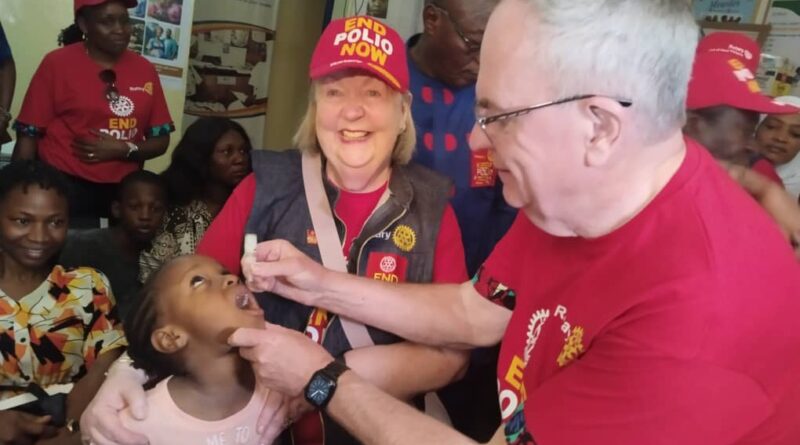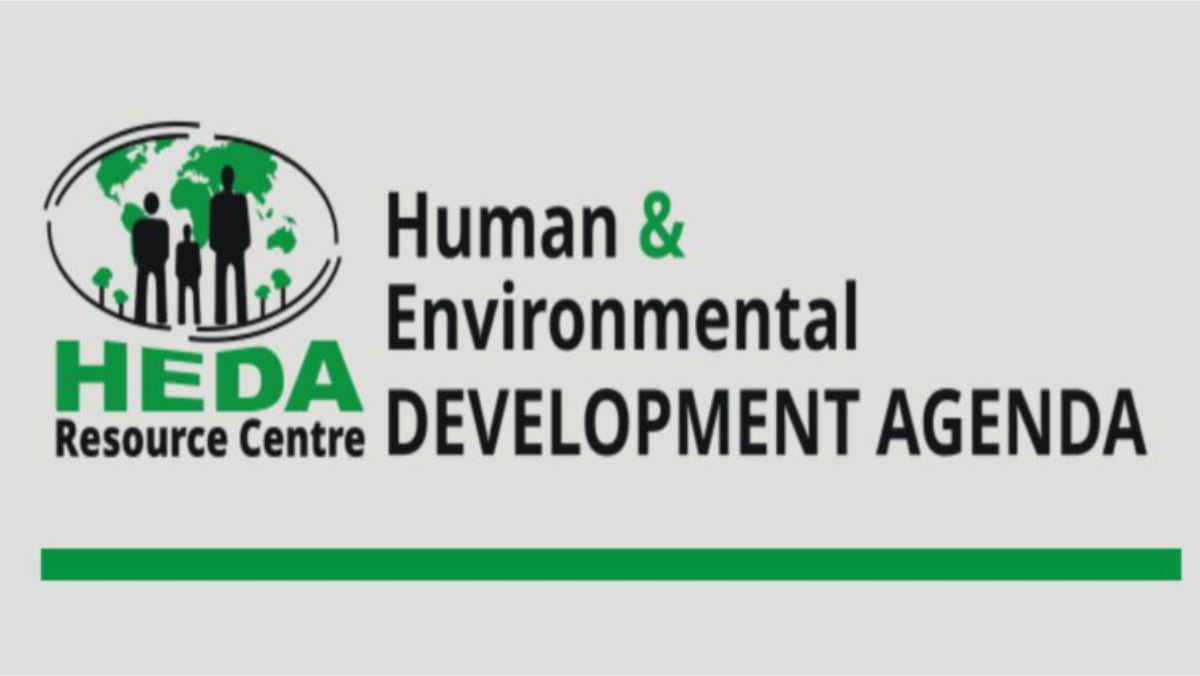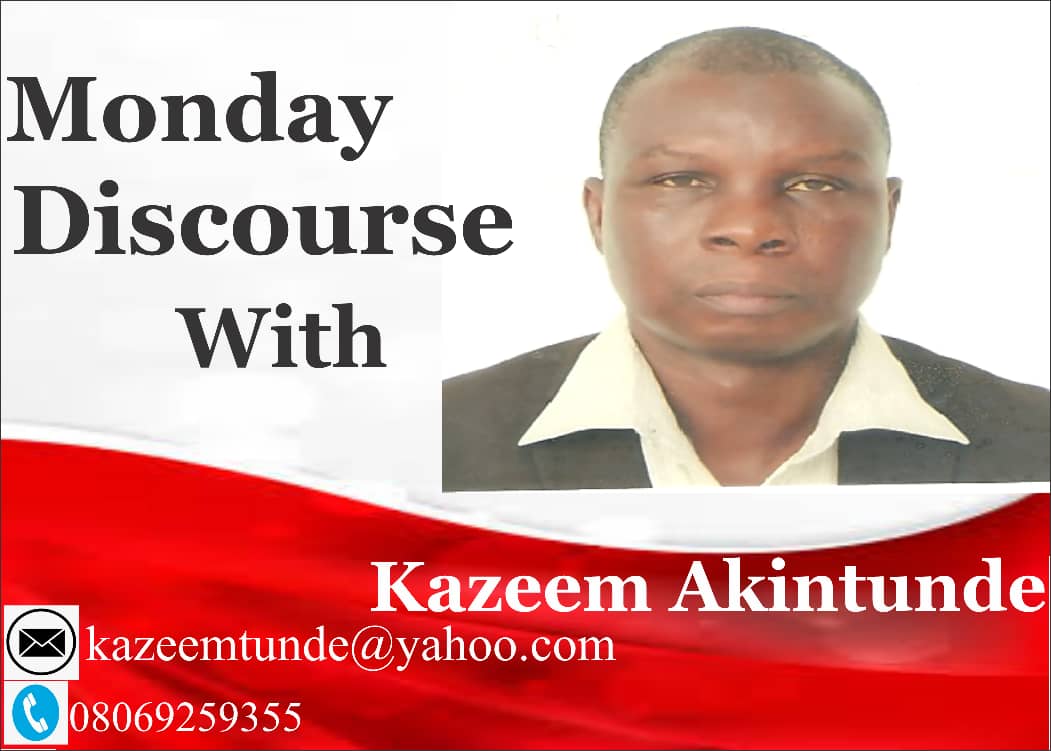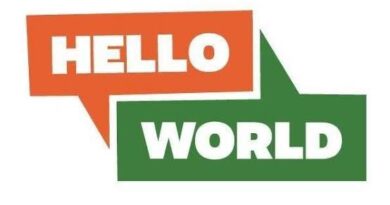$2m grant: Rotary President seeks nationwide expansion of family reproductive health project
PIX – 2: A child, Shiloh Salami, receiving polio vaccine from the President of Rotary International, Gordon Mclnally and his spouse, Heather, in the Primary Health Care Clinic, Area 2 Garki Abuja yesterday.
…Says vigilance needed for Nigeria to remain polio-free
The Rotary International President, Gordon Mclnally, has recommended the expansion of the organization’s $2million maternal and child advancement project to the 36 states in Nigeria and the Federal Capital Territory (FCT).
The three year Rotary International project with the theme “Together for Healthy Families in Nigeria” is currently being implemented in six states.
The RI President McNally, who is visiting Nigeria for the first time, made the call in Abuja on Saturday during a Rotary Community Dialogue held at the Kuchingoro Primary School.
He also said Nigeria must continue to sustain its surveillance strategy to ensure that the country remains polio-free.
Mclnally who described the “Together for Healthy Families in Nigeria” project as “wonderful” said its impact should be felt across the country.
McNally said: “One of the things that we need to continue doing (in Nigeria) is to be vigilant and to continue our surveillance to ensure that Nigeria remains polio free. But also the project we are visiting here today is a wonderful project.
“It’s a multifactorial project. It’s a project improving families here in Nigeria. And of course, it’s doing that by giving women access to reproductive advice, giving women access to contraception, encouraging the men in their lives to be part of that decision-making process, and it’s also encouraging pregnant women to take good care of themselves during their pregnancy and then at the point of delivery.
“Because as we know, many women continue to have babies at home, and that is where the mortality is highest. If these ladies can have their babies and deliver their babies safely in a clinic environment, then the chances of them suffering the ultimate of losing their life, suffering in the delivery, and the possibility of the babies being delivered stillborn or losing their lives in an early stage is very much reduced.
“I would encourage everybody to look at this project, at the moment, it’s a project operating in six of the 36 states here in Nigeria.
“With appropriate funding, I’m convinced it could be rolled out to all 36 states including the Federal Capital Territory here in Abuja and that way we could see a huge difference in the mortality rate among delivering mothers and neonatal babies.
“At this stage, Rotary has committed $2m to the project, and there has been a further close to a million US dollars being committed within Nigeria itself.
“It’s a three-year project at present, a pilot project that is bearing good results already and will prove itself and then hopefully will qualify for further funding from many different sources.”
While assuring that the global body would continue to offer support to Nigeria in all the major areas of focus for intervention, Mclnally expressed optimism that donors would support the project.
“We are encouraging partners to recognise the success of this project and come on board with us because we can’t do this alone.
“We need to do this with partners and I’m sure there are many partners who would want to be part of this and ensure that this is a successful project.
“There are many grants in store for Nigeria. The way the Rotary Foundation, which is our charitable arm operates, is that we seek bids for grants and I know that bids are coming in from Nigeria all the time for various projects across all of our areas of focus, across education, across health, across maternal and child care, across water and sanitation, economic development, peace, which is a very important aspect of Rotary’s work and the environment,” he added
Earlier, Mclnally and his wife Heather, with officials of Rotary Nigeria visited the Garki Primary Health Centre where both of them administered polio vaccines to some children before being conducted round the facility.
At the Kuchingoro Primary Health Centre, Mclnally was also conducted round the facility to see some Rotary-sponsored projects after which the party departed for the Kuchingoro Primary School.
Chairman of Nigeria National Polio Plus Committee (NNPC)/End Polio Now Coordinator, Zone 22, West Africa, Joshua Hassan, said Polio eradication has been the flagship of Rotary intervention for years and the focus was to eliminate it, as well as its variants from the face of the earth.
He said with the core partners of the Global Polio Eradication Initiative like the World Health Organization (WHO) and the United Nations Children’s Fund (UNICEF) among others are being supported by the committee to carry out their operations.
He said: “UNICEF is being supported principally with funds and grants for their operations, procurement, transportation of vaccines and other logistics.
“For WHO, we specifically support their operations and surveillance because it is through surveillance that it is known whether polio is in a community or in the environment.”
On funding, he said that in 2024, Rotary has supported WHO with not less than $14million.
He also disclosed that another $7million was given to UNICEF to support their operations not long ago.

Photo: The President of the Rotary International, Gordon Mclnally carrying a Gbagi native calabash on his head When he visited Kuchigoro Village in Abuja yesterday.
He said Rotary has also been very active in supporting other areas of human endeavours with a focus on seven areas at any given time, including the environment, peace and conflict resolution, maternal and child health, disease prevention, water, sanitation and hygiene among others.
On his part, the National Coordinator, of Together for Healthy Families in Nigeria, Prof. Dolapo Lufadeju, said Rotary Nigeria is working in over 500 PHCs across the country where several different interventions are being undertaken by Rotary.
He said though the Together for Healthy Families in Nigeria,’s Community Dialogue’s $2million
budget is inadequate, efforts are being made to shore it up and sustain it.




